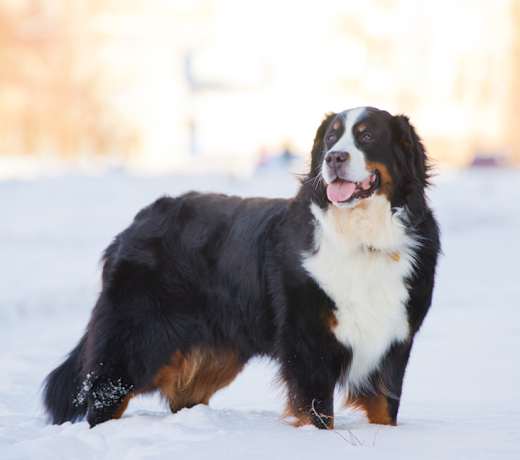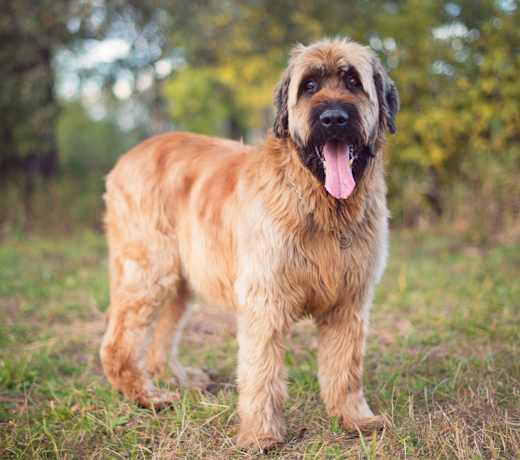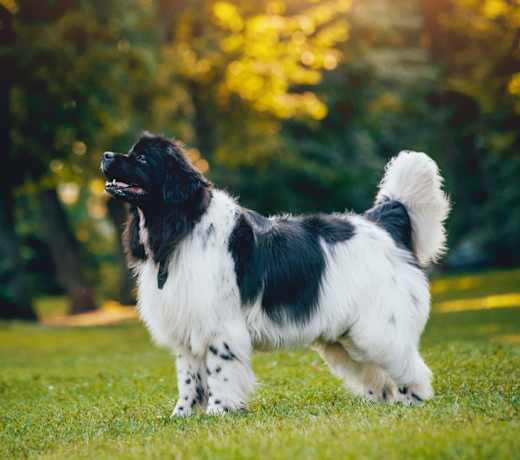Bouviers des Flandres are large and powerful dogs. Adult males are typically 22 to 28 inches tall at the shoulder, while females are slightly smaller. The breed typically weighs between 60 and 103 pounds.
Bouvier des Flandres
Breed Type: Herding
Common nicknames: Bouvier, Flanders Cattle Dog
Coat: Double
Hypoallergenic: Yes, they may not trigger allergies.
Temperament: Affectionate, loyal, adaptable, smart
Life expectancy: 10-12 years
Color & patterns:
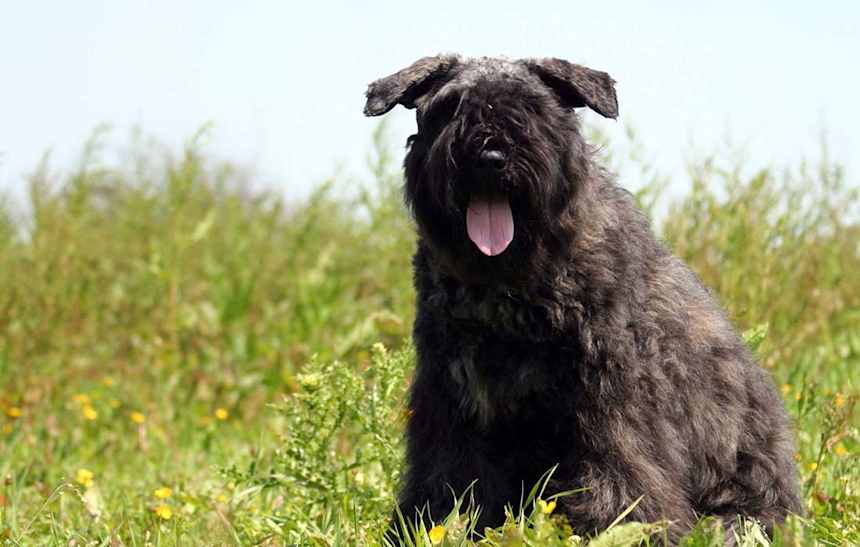
The Bouvier des Flandres, also known as the “gentle giant,” is a magnificent breed that combines strength, intelligence, and a whole lot of love. With their sturdy builds and shaggy coats, they have an undeniable presence that commands attention. But their imposing appearance can be deceptive, as they are gentle and affectionate with their loved ones. Related to the Schnauzer, these dogs share similar characteristics, such as intelligence and a willingness to please. Bouviers are known for their loyalty and protective nature, making them excellent family companions and reliable guardians. With proper socialization and training, they can be friendly and well-behaved in various settings. If you’re seeking a devoted and versatile pup, the Bouvier des Flandres might be the breed for you.
Bouvier des Flandres characteristics
Learn about about Bouvier des Flandres basics like their fur colors, shedding levels, how much grooming they need, and other Bouvier des Flandres facts.
Average height
22-28 inches (55.9-71.1cm)
Average weight
60-103 pounds (27.2-46.7 kg)
Average lifespan
10-12 years
Exercise needs
Grooming needs
Full-grown size
Good with cats
Good with kids
Training Aptitude
When do Bouviers des Flandres stop growing?
Bouviers des Flandres stop growing in height by around 12 to 18 months of age. However, they continue to fill out and develop muscle mass until they are about two to three years old. Males, in particular, take a bit longer to fully mature.
What colors do Bouviers des Flandres come in?
Bouviers des Flandres come in a variety of colors, including fawn, pepper and salt, gray, brindle, gray brindle, and black.
Do Bouvier dogs shed a lot?
Bouvier des Flandres dogs are low to moderate shedders. Their thick, double coat is designed to protect them from harsh weather, and while they do shed, the coat tends to trap loose hair, which can reduce the amount of fur that ends up around the house.
Their coat requires regular grooming to prevent matting and to manage shedding. Brushing them several times a week helps to remove loose hair and keep their coat in good condition. Without proper grooming, their coat can become tangled and matted.
Bouvier des Flandres temperament
Learn about about the Bouvier des Flandres temperament and how well they fit into your lifestyle, home environment, and family.
Are Bouviers des Flandres good with kids?
Yes, Bouviers des Flandres dogs are good with kids. Bouviers are naturally protective and often see children as part of their “pack.” They are watchful and caring, often acting as gentle guardians. Despite their large size and powerful build, Bouviers are typically calm and tolerant, especially with children. Bouviers also have a playful side, which can be great for active children who enjoy spending time outdoors.
Due to their size and strength, it’s important to supervise interactions between Bouviers and very young children to ensure play doesn’t get too rough. Early socialization and training are key to helping Bouviers develop good manners and adapt well to family life, as is teaching children how to properly approach and handle dogs.
Are Bouviers des Flandres good with cats?
Bouviers des Flandres can be good with cats, but it often depends on their individual temperament, early socialization, and how they are introduced to the cat. Each Bouvier is unique. Some might have a high prey drive or a strong instinct to chase, which can pose challenges. If a Bouvier is socialized with cats from a young age, they are more likely to get along well with them.
Are Bouviers des Flandres good with other dogs?
Bouviers des Flandres can be good with other dogs, but individual temperament plays a role. Some Bouviers might have a stronger prey drive or be more dominant, which can affect their interactions with other dogs. Proper socialization from a young age is crucial. Bouviers exposed to a variety of dogs and situations early in life are more likely to be well-adjusted and friendly toward other dogs.
How much do Bouviers des Flandres bark?
Bouviers des Flandres dogs are not excessive barkers. They are known to be relatively quiet, calm and reserved, and bark when they have a reason, such as to alert their pet parents of something unusual or to guard their home. Due to their protective nature, they might bark to signal potential threats or unfamiliar people, but they are not typically noisy without cause.
Are Bouviers des Flandres good family dogs?
Yes, Bouviers des Flandres dogs are good family dogs. Affectionate and loyal, Bouviers form strong bonds with their families. They are adaptable and can handle various activities, from playtime with kids to more serious tasks like herding or obedience work. Bouviers thrive in homes where they can be active and engaged, so they are best suited for families that can provide the time and attention they need.
Are Bouviers des Flandres easy to train?
Yes, Bouviers des Flandres are intelligent and responsive, which can make them relatively easy to train. Bouviers are smart dogs that can learn commands and tasks quickly. However, they do have a strong, independent streak and can sometimes be stubborn, so they require patience and consistent handling. Using positive reinforcement methods, such as treats and praise, tends to be the most effective approach. Also, keep in mind that even if a certain dog breed is known to be easy to train, training any dog requires a long-term commitment.
How intelligent is a Bouvier?
The Bouvier des Flandres is highly intelligent. They are good at solving problems and can figure out how to navigate challenges or tasks that require thought. Their smart nature makes them capable of learning complex tasks and commands, though they require consistent, engaging training to keep their interest and focus. Their intelligence allows them to excel in various activities, including herding, obedience competitions, and even some types of work such as search and rescue.
Are Bouviers des Flandres friendly?
Yes, Bouviers des Flandres dogs are friendly and affectionate, particularly with their family members. Although they are friendly, they also have a protective instinct, which can make them vigilant and caring guardians of their families.
Bouvier des Flandres history
Learn about where the Bouvier des Flandres came from.
Are Bouviers a rare breed?
Yes, the Bouvier des Flandres is a relatively rare breed, especially outside of its native regions of Belgium and France. While dog enthusiasts recognize and appreciate them for their working abilities and loyal nature, they are not as commonly found as more popular breeds like Labrador Retrievers or German Shepherd Dogs.
Where are Bouviers des Flandres from?
The Bouvier des Flandres is from the Flanders region, which spans parts of Belgium and France. Historically, they were bred as versatile working dogs, used for herding cattle, pulling carts, and serving as guard dogs. The breed is known for its strong, muscular build, dense coat, and loyal, protective nature.
How long do Bouviers des Flandres live?
The Bouvier des Flandres lives 10 to 12 years on average. With regular veterinary care, a healthy diet, and proper exercise, some might live longer.
Bouvier des Flandres health
Learn about about the Bouvier des Flandres health outlook and what diseases they may be prone to at various stages of their life.
Are Bouviers des Flandres healthy?
Yes, Bouvier des Flandres are generally considered a healthy breed, but, like any dog, they can develop certain health issues. With proper care, regular checkups, and attention to breed-specific health concerns, Bouvier des Flandres can live healthy, fulfilling lives.
What diseases are Bouviers des Flandres prone to?
Like all breeds, Bouviers des Flandres are prone to certain health issues. Common health concerns in Bouviers include:
Bouvier des Flandres myopathy: Also known as “hereditary myopathy of the Bouvier des Flandres” (HMB), this is a form of muscular dystrophy where the muscles weaken over time. A genetic test for Bouvier des Flandres myopathy is available so breeders can avoid passing on the condition.
Subaortic stenosis: This congenital heart condition can affect Bouvier des Flandres dogs, among other breeds. It involves a narrowing of the area below the aortic valve in the heart, which obstructs the blood flow from the left ventricle into the aorta and subsequently to the rest of the body.
Ectopic ureters: This is a congenital condition where one or both of the ureters, which are the tubes that carry urine from the kidneys to the bladder, do not connect properly to the bladder. This condition can lead to various urinary issues and is known to occur in some dog breeds, including the Bouvier des Flandres.
Laryngeal paralysis: This condition causes paralysis of the muscles responsible for controlling the vocal cords (larynx), which leads to difficulties in breathing and voice production.
Portosystemic shunt (PSS): Also known as a liver shunt, this is a condition where blood flow from the digestive organs bypasses the liver and goes directly into the systemic circulation. This abnormal blood flow can lead to various health issues because the liver is not able to properly process toxins and nutrients from the blood.
Hip dysplasia: This is a genetic condition where the hip joint doesn’t fit into the hip socket properly, potentially leading to arthritis and pain.
Elbow dysplasia: Similar to hip dysplasia, this condition affects the elbow joint and can cause lameness and pain.
Eye issues: Bouviers are sometimes affected by cataracts (an eye condition that obstructs vision), glaucoma (a disease that causes excessive pressure on the eye, damaging the optic nerve), and progressive retinal atrophy (a genetic condition that can lead to vision loss and blindness over time).
Hypothyroidism: An underactive thyroid gland that can lead to various health issues, including weight gain, lethargy, and skin problems.
Bloat (gastric dilatation-volvulus): A serious condition where the stomach fills with gas and twists, which can be life-threatening and requires immediate medical attention.
Are Bouvier des Flandres hypoallergenic?
Yes, Bouvier des Flandres are considered hypoallergenic because they shed less than some other breeds. However, no dog is completely hypoallergenic, and Bouvier des Flandres dogs still produce dander, which is a common allergen. If you have allergies, it’s important to spend time around adult Bouviers to see how you react before making a decision to bring one home.
Do Bouvier dogs smell?
No, Bouvier des Flandres dogs do not smell or have a strong odor if they are properly groomed and cared for. However, the Bouvier’s dense, double coat can trap dirt, moisture, and odor if not regularly maintained. Frequent brushing helps remove loose hair and debris, which can reduce odor. Regular bathing (as needed) also helps keep their coat clean and fresh.
Popular Bouvier des Flandres mixes
Bouviers des Flandres are sometimes mixed with other breeds, resulting in interesting combinations. Some common mixes include:
Bouvipoo or Flandoodle (Bouvier des Flandres + Poodle)
Bouberman (Bouvier des Flandres + Doberman Pinscher)
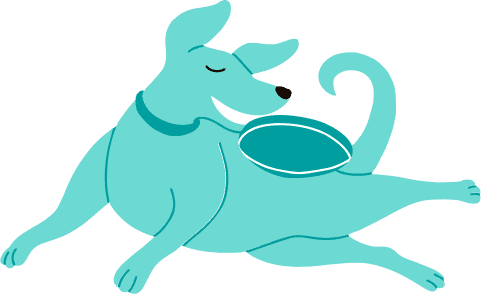
Find Bouvier des Flandres puppies near you
Adopting a Bouvier des Flandres
We don't see any Bouvier des Flandres available for adoption in your exact location or cities near you, but here are some adorable similar breeds in Beverly Hills, CA.
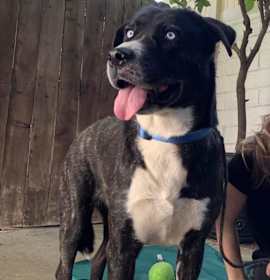
Sweet Winona
Bernese Mountain Dog Australian Shepherd
Female, young
Los Angeles, CA
House-trained
Spayed or Neutered
Shots are up-to-date

Sweet Winona
Bernese Mountain Dog Australian Shepherd
Female, young
Los Angeles, CA
House-trained
Spayed or Neutered
Shots are up-to-date

